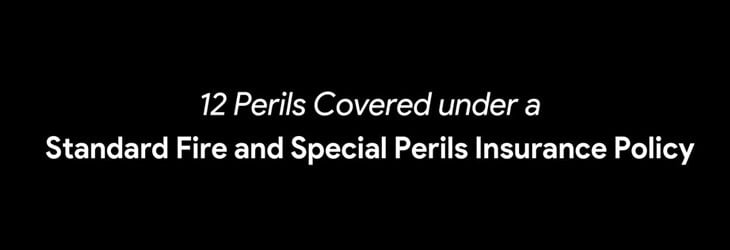Business owners invest crores of rupees in assets such as plant and machinery, buildings, offices, warehouse stocks etc. Thus, it is important to secure these assets with a Fire Insurance Policy.
Fire Insurance, also known as a Standard Fire and Special Perils Insurance Policy provides reimbursement in case the insured assets are damaged by fire and associated perils.
It is important to understand the coverages under a Fire Insurance Policy.
A Fire Insurance provides cover against 12 Perils as follows:

- What is a Fire Insurance Policy?
- What is the need for a Standard Fire and Special Perils Insurance Policy?
- What are the Perils covered under a Fire Insurance Policy?
- What are the Principles of a Fire Insurance Policy?
- Principle of Insurable Interest
- Principle of Utmost Good Faith
- Principle of Proximate Cause
- Principle of Indemnity
- Principle of Subrogation
- Principle of Contribution
- What are the Add-On Covers available in a Fire Insurance Policy?
- Types of Fire Insurance: What are they?
- Stock Declaration Policy
- Floater Policy
- Average Policy
- Agreed Value Policy
- What is Bharat Sookshma Udyam Suraksha Policy?
- What is Bharat Laghu Udyam Suraksha Policy?
- What can be Insured with a Fire Insurance (Standard Fire and Special Perils) Policy?
- How is the Premium calculated under a Fire Insurance Policy?
- How to fix Sum Insured under a Fire Insurance Policy?
- What are the Exclusions in a Fire Insurance Policy?
- How to Claim Fire Insurance?
- Get the Best Quotes for Fire Insurance Policy
- FAQS
- Testimonials

